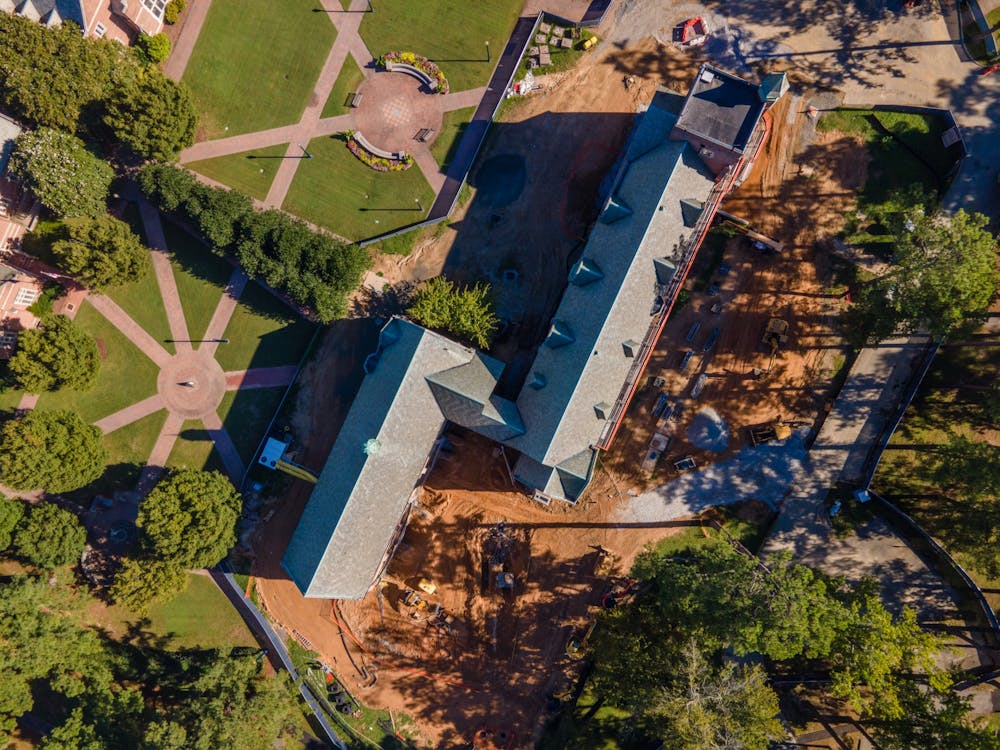Faculty members of the School of Arts and Sciences released two statements voicing their support for the renaming of Mitchell-Freeman and Ryland halls in solidarity with the Black Student Coalition-led movement to reverse the Board of Trustees’ decision to retain the building names.
The first statement, which was written by the chairs of the English, classical studies, history and philosophy departments that will be based out of Ryland Hall, was released on March 30 in support of the BSC’s decision to disaffiliate and the University Faculty Senate’s March 19 statement on institutional history.
The department chairs include Julie Laskaris, David Stevens, Joanna Drell and David Lefkowitz. The faculty of the departments are scheduled to move into the building next fall following the completion of its renovation.
“Surely there are ways to recognize the important contributions that Robert Ryland made to the establishment of Richmond College that do not require our Black students, staff, and faculty to study and work in a building whose name honors a person who would have viewed them as sub-human property,” the chairs wrote.
The faculty of the four departments felt they had a special need to speak on the names in their own statement, and hoped for a larger conversation to take place with the board and the community, David Lefkowitz, chair of the philosophy department, said.
Nicole Sackley, professor of history and American studies, has taught in Ryland Hall for 15 years and said faculty members had been very conscious of their role as humanists. She said they found it necessary to recognize the distinction between putting a name on a building and writing history.
“The cultural meaning of building names and monuments are really only to honor,” Sackley said. “Nobody puts up a statue to explain complicated history.”
Lefkowitz said the department chairs wanted to make sure they addressed the Board’s statement about the importance of the building names to UR’s history, especially as faculty in humanities departments.
“We argue instead that a principal aim of work in the Humanities is to uncover and contend with the moral wrongs of the past, helping to chart a future in which all people equitably share,” they wrote.
The statement from the School of Arts and Sciences faculty that was released on March 31 addressed the same point.
“Removal of these names will not lead to the erasing of this history. To the contrary, their removal constitutes both an acknowledgment of our past and an exhortation to become the University of Richmond we aspire to be,” the statement said.
The School of Arts and Sciences’ statement was approved by 97% of its faculty and had 90% participation, according to an email sent to The Collegian by Michelle Hamm, the School of Arts and Sciences faculty chair.
Enjoy what you're reading?
Signup for our newsletter
Hamm, professor of chemistry and chair of the Steering Committee, said committee members had begun drafting the statement on March 22 in response to the Board’s decision to not rename the buildings after the School of Arts and Sciences faculty meeting.
The Steering Committee -- which includes five elected faculty members, the previous years’ School of Arts and Sciences chair, one full-time staff member in the school of Arts and Sciences and the dean of the School of Arts and Sciences -- is in charge of faculty governance in the School of Arts and Sciences.
“We support all efforts to make the difficult history of the University of Richmond public and easily accessible to students, faculty, staff, graduates, and visitors,” the Steering Committee wrote. “These efforts require us to confront our past and encourage us to imagine equitable forms of engagement as we wrestle to overcome the structural inequities and individual biases that stem from these legacies.”
Of the 259 faculty members in the School of Arts & Sciences, 223 approved the statement, seven opposed and four abstained, Hamm wrote in an email to The Collegian. Approval and participation were anonymous, she said.
“We have listened to our students and understand that their education and ability to grow as individuals is undermined when they feel devalued in and excluded from the spaces in which they live and learn,” the committee wrote.
The committee wanted to speak as a collective voice as an Arts & Sciences faculty, not only for the Board but also for colleagues and students, Hamm said.
The faculty of the four departments that will occupy Ryland Hall urged UR President Ronald Crutcher and the Board to work with the Faculty Senate to replace the names of Robert Ryland and Douglas S. Freeman on university buildings, “... so that faculty, students, and staff can feel that the University of Richmond is truly their home,” the chairs wrote at the end of their statement.
“I do think it’s revealing to many about the responsibilities and power of a Board of Trustees, not only at the University of Richmond but at other universities, too,” Sackley said. “The ball is in their court right now.”
Contact news writer Natasha Sokoloff at natasha.sokoloff@richmond.edu.
Support independent student media
You can make a tax-deductible donation by clicking the button below, which takes you to our secure PayPal account. The page is set up to receive contributions in whatever amount you designate. We look forward to using the money we raise to further our mission of providing honest and accurate information to students, faculty, staff, alumni and others in the general public.
Donate Now



